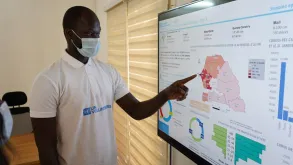When the United Nations rolled out its response to COVID-19, the UN Volunteers (UNV) programme invested in the strategic placement of national UN Volunteers to support partners in their tireless fight against the pandemic and its impact on sustainable development. UN Volunteers serving in information and communication technology and data entry, for example, have helped build digital platforms and develop web-based communications, keeping everyone connected in hard times and improving the overall crisis response. Their assignments are financed from UNV's Special Voluntary Fund.*
The COVID-19 pandemic has increased demand for remote work and data access. At the same time, countering stereotypes and misinformation has become necessary for the progress of the pandemic response efforts. However, in many countries, the information systems and architecture necessitated by remote environments have lagged behind. As a result, access to health information and healthcare has been complicated.
For example, it made it harder to locate available services amidst lockdowns and travel restrictions. Furthermore, relief organizations have struggled to identify the most vulnerable when and where they need help the most. Support delivered by UN Volunteers serving in the field of information and data management have contributed to addressing these very challenges.
In Nepal, Prerana Lama is a national UN Volunteer serving as Information Management Officer with the UN Resident Coordinator's Office. She gathers multisector data, conducts analysis and prepares updates on national COVID-19 mitigation activities. Prerana’s contributions prompted the UN Resident Coordinator in the country to describe her as an "invaluable asset".
In Lebanon, another Information Management Officer, national UN Volunteer Malek al Jebaie, serves in support of UNDP’s Disaster Risk Management Unit. Malek synthesized data harvested from partners to generate online dashboards that illustrate the flow of aid and supplies to Lebanese hospitals per location, bed and intensive care unit occupancy rates, and other indicators. These dashboards helped identify key trends and gaps in the healthcare sector and enabled a more targeted information and referral process relative to hospital capacities. Such information helped reduce the time, economic and human resources required to connect care seekers with care providers.
A similar dashboard was devised to facilitate response to the Port of Beirut blast in August 2020. Within hours of the blast, which wreaked havoc and caused widespread damage in the coastal city, Malek helped in setting up a dashboard that illustrated the location, capacity, terms and contact information of emergency shelters or accommodations offered by volunteers for the displaced.
Mariia Teteriuk, who also serves as a national UN Volunteer Information Management Specialist, is supporting the response efforts of the UN Office for the Coordination of Humanitarian Affairs (OCHA) in Ukraine.
I produce visualizations and provide technical support to help partners submit data for flagship documents. In this vein, I have contributed to the Humanitarian Response Plan and a range of snapshots and dashboards that give partners quick access to geographic and demographic data. --Mariia Teteriuk, UN Volunteer Information Management Officer with UNOCHA, Ukraine
These contributions help partners in the humanitarian field access reliable data and information they need more easily and efficiently. For instance, Mariia supported with data cleaning for a COVID-19 Response Dashboard, which outlines disease mitigation measures undertaken by national and international partners in the conflict-affected Donetska and Luhanska oblasts of Ukraine. "This year, information related to the COVID-19 response will be incorporated alongside other data about the humanitarian context. This will help partners locate the updates they need more easily and efficiently," explains Mariia.
Health information management is crucial for a sustained and coordinated response to the pandemic. I am collecting, classifying and analyzing various data on COVID-19 from relevant government agencies to facilitate effective planning of the national response. --Gorgui Ba Toure, UN Volunteer Information Management Officer with WHO, Senegal
In Senegal, Gorgui Ba Toure is a national UN Volunteer supporting the World Health Organization (WHO) as an Information Management Officer. He assisted with the development of an information system and knowledge-sharing practices, which helped partners establish a COVID-19 pandemic response. Moreover, Gorgui utilized these tools to collect and maintain data through weekly snapshots that help partners identify risks across sectors and regions and monitor infection rates in real-time.
The above examples demonstrate how digital skills and technical support can accelerate COVID-19 pandemic response – even in conflict and crisis-ridden contexts. They also testify to the power of volunteering in boosting disaster response and risk reduction in health emergencies.
*UNV's Special Voluntary Fund (SVF) was established by the United Nations General Assembly in 1970. Over time, the SVF mandate has been modified and expanded, with the SVF providing seed funding to scale up successful projects where volunteerism has had a transformative impact. The SVF is also used to develop innovative volunteer-based solutions as well as undertake research and knowledge sharing. Read more here.

